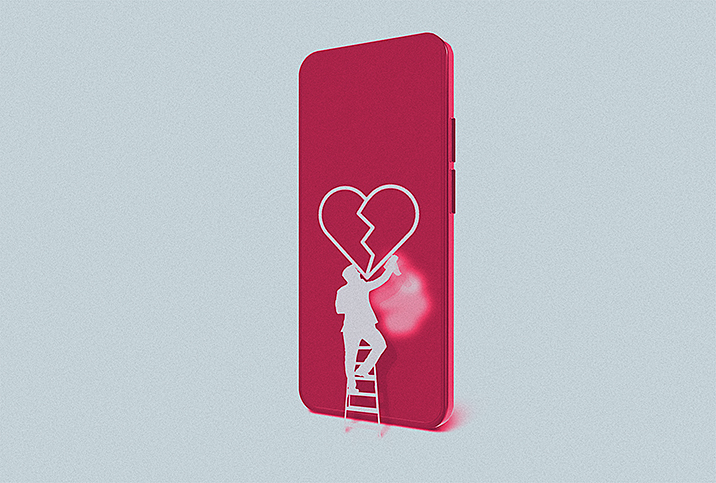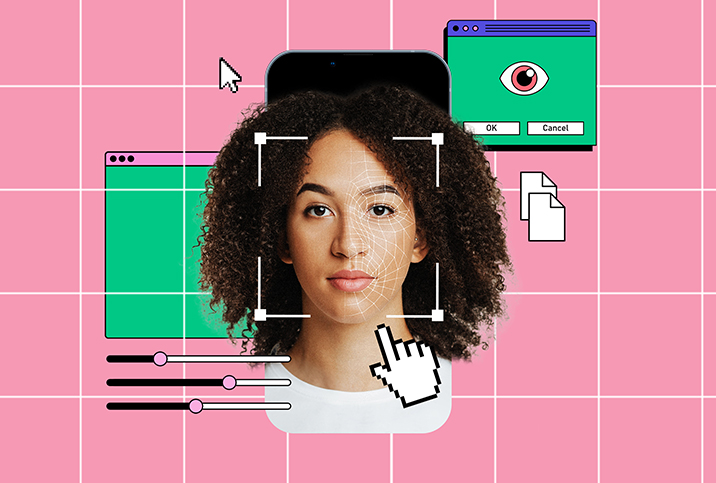Manage Your Social Media Footprint While You're Dating

Your social media footprint is the trail you leave behind when you post on social media. Following years of relentless posting, your footprint may be huge.
Platforms such as Instagram, Twitter and Facebook make it easy to share your innermost thoughts, experiences and feelings with a touch of a button. Research indicates the "online disinhibition effect" makes people self-disclose more frequently online than they ever would in real life.
While having a place to share and be vulnerable sounds great in theory, once you post something online, it's never really not there. Even if you archive or delete intimate posts, there could still be a screenshot or backup somewhere else. The internet, of course, has its own websites built to keep records of past sites. As a result, dating experts urge users be mindful of what they share online and to keep these key factors in mind:
Expect to be investigated
It's not necessarily the FBI we're talking about here, but people do investigate you. We all know how it goes: You match with someone on a dating app, then you check their Instagram to see if they're a real person and how they present themselves to their friends. It's not just potential partners, either—it could be your employer, a family member or someone who knows you from school. These days, younger and older generations alike use social media to check on you and get a first impression.
"Your social media is essentially your brand," said Jessica Small, a Denver-based licensed marriage and family therapist with Growing Self Counseling and Coaching. "Potential prospects are going to be looking at your social media accounts to get an idea of who you are and your dating history, so it's important to consider what you want your accounts to say about you."
Archive old posts
Dating experts agree that an Instagram page full of posts about your ex isn't a good look.
"When I see recent photos of exes or posts about a recent date, it makes me wonder if this person is serious about finding a relationship," said Amanda Rose, a celebrity matchmaker and the CEO of the Dating Boutique, an online dating consultancy.
From tearful posts about how your ex cheated on you to romantic photo dumps of anniversaries past, it's wise to cleanse your page after a breakup.
But what if you're not ready?
"Holding on to old pictures of your ex may be a reflection of where you are in the grief process," Small explained. "The final stage of grief is acceptance, and when people reach acceptance, they often feel comfortable letting go of mementos."
Be sure to archive those old, intimate posts, but stay patient if you need more time to process grief. Just try not to air your dirty laundry on social media as you go through the grieving process.
Reconsider your 'vulnerability porn'
Social media commonly invites "vulnerability porn," or posting at your lowest points for validation, empathy and likes. Also known as "sadfishing," this trend involves sharing photos from unflattering angles, monologues of personal trauma or recounting awkward moments.
Before posting videos of trauma or your lowest moments, Small suggested thinking about what needs you are trying to meet by posting them.
"If you're seeking comfort, sharing your pain with a close friend or relative who can adequately support you may be a better idea," she explained. "Plus, you won't risk the vulnerable post getting into the wrong hands.
"People that successfully share vulnerable information on social often have already processed their pain elsewhere and are posting the information as a way to normalize and relate," Small added.
Try to portray your authentic self
Projecting your authentic self online has become increasingly difficult, given the desire to be accepted and the pressure to look a certain way. Still, studies show people who are more authentic in their self-expression have higher life satisfaction.
Small recommends trying the following exercise:
- Write down how you want to be perceived, whether that's adventurous, fun, kind, social, romantic, secure or laid-back.
- Go into your social media accounts and examine whether your posts are consistent with those characteristics.
- Get rid of any posts that are not aligned with how you want to be perceived by a potential partner.
"While your social media self will be a more curated view into your life and you have more control over what you share, your real self and online self shouldn't be so far apart that you're not the same person both offline and online," Small noted.
Consider switching to private
Switching your privacy settings to be more restrictive is an effective way to control who sees what you share online—it's what they're there for.
"Putting your profiles on private can protect you from false judgments, give you the chance to create authentic in-person connections and keep your dates curious," Rose explained.
Then why do so many people opt against switching to private?
"People keep their profiles public to create a storyline of their life in an ideal setting," Rose said. "In other words, social media gives us a chance to present a filtered version of ourselves for other people to see. At the same time, our profiles show some of the most private areas of our lives, such as our children, family or job location."
Consider whether you really want a stranger to have access to all that information.
Think before you post
Controlling your online image isn't easy, especially when you can overshare with the tap of a finger. Before you post online, do a quick mental check. Ask yourself, "Will I be OK with this a year from now?" and "Does this align with who I want to present now?"
Since strangers and potential dating prospects see your social media, self-censorship is a must. Be mindful about what you post and don't be afraid to delete and archive posts that no longer represent you.


















